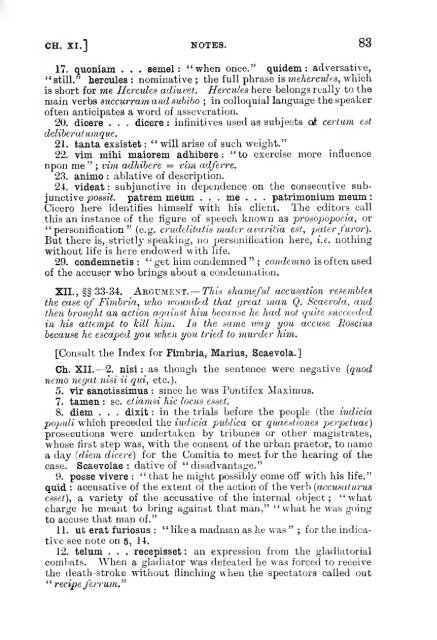Pro S. Roscio Amerino
Pro S. Roscio Amerino
Pro S. Roscio Amerino
You also want an ePaper? Increase the reach of your titles
YUMPU automatically turns print PDFs into web optimized ePapers that Google loves.
CH. XI.] NOTES. 83<br />
17. quoniam . . . Bemel : "when once." quidem : adversative,<br />
"still." hercules : nominative ; the fuU phrase is nieAercii/fs, whieli<br />
is short for me Hercules adiuvet. Hercules here belongs really to the<br />
main verbs succurramandsuhibo ; in colloquial language thespeaker<br />
often anticipates a word of asseveration.<br />
20. dicere .<br />
deliberatumque.<br />
. . dicere : infinitives used as subjects oi cerlum est<br />
21. tanta exsistet " : will arise of such weight."<br />
22. vim mihi maiorem adhibere " : to exereise more<br />
npon me<br />
influence<br />
" ; vim adhibere = vim adferre.<br />
23. animo : ablative of description.<br />
24. videat : subjunctive in dependence on the consecutive subjunctive^ossii.<br />
patrem meixm . . . me . . . patrimomum meum<br />
Cicero here identifies hiraself with liis client. The editors call<br />
this an instance of the figure of speeeh known as prosopopoeia, or<br />
" personification " (e.g. crudelitatis mater avaritia est, pater furor).<br />
But there is, strictly speaking, no personification here, i.e. nothing<br />
without life is here endowed with life.<br />
29. condemnetis " : get him condemned " ; condemno is often used<br />
of the accuser who brings about a condemnation.<br />
XII., §§ 33-34. Argument.—This shameful accusation resembles<br />
the case of Fimbria, who wounded that great 77ian Q. Scaevola, and<br />
ihen brought an action against him because he had not qiiite succeeded<br />
in his attempt to kill him. In the same way you accuse Roscius<br />
because he escaped you when you tried to murder him.<br />
[Consult the Index for Fimbria, Marius, Scaevola.]<br />
Ch. XII.—2. nisi : as though the sentence were negative {quod<br />
nemo negat nisi ii qui, etc).<br />
5. vir sanctissimus : since he was Pontifex Maximus.<br />
7. tamen : sc. etiamsi hic locus esset.<br />
8. diem . . . dixit : in the trials before the people (the iudicia<br />
pojndi which preceded the iudicia publica or quaestiones perpetuae)<br />
prosecutions were undertaken by tribunes or other magistrates,<br />
whose first step was, with the consent of the urban praetor, to name<br />
a day {diem dicere) for the Comitia to meet for the hearing of the<br />
case. Scaevolae : dative of "disadvantage."<br />
9. posse vivere : " that he might possibly come off with his life."<br />
quid : aceusative of the extent of the action of the verb (accusaturua<br />
esset), a variety of the aecusative of the internal object ; "what<br />
charge he meant to bring against that man," " what he was going<br />
to accuse that nian of."<br />
11. ut erat furiosus " : like a madman as he was "<br />
; for the indica-<br />
tive see note on 5, 14.<br />
12. telum . . . recepisset : an expression from the gladiatorial<br />
combats. When a gladiator was defeated he was forced to receive<br />
the death-stroke without fliuching when the spectators called out<br />
" recipe ferrum."<br />
:

















